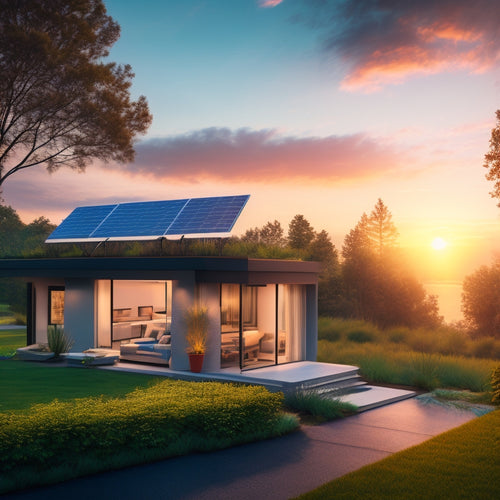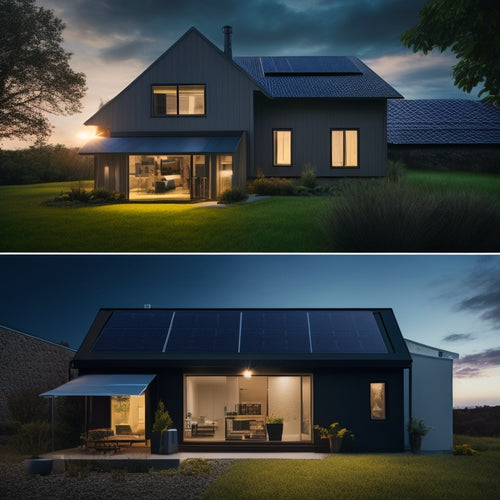
Solar Panels for Your Business
Share
By investing in solar panels, you can greatly reduce your business's energy dependence on the grid, protecting your bottom line from fluctuating electricity prices and enhancing your reputation through a commitment to sustainability. You'll cut energy costs, reduce your carbon footprint, and enjoy tax incentives that further enhance your profits. With high-efficiency cells and proper installation, you can maximize energy harvesting and minimize maintenance costs. Understanding the impact of roof obstructions, tree shade, and durable materials is essential for peak performance. Now, explore how to overcome common challenges and access the full potential of solar energy for your business.
The Essentials
- Solar panels significantly reduce energy costs and dependence on the grid, shielding businesses from fluctuating electricity prices.
- Investing in solar panels leads to energy management and sustainability, lowering reliance on the grid and freeing up resources for business growth.
- Tax incentives and net metering further lower expenses and enhance profits while establishing a sustainable business model that meets eco-conscious expectations.
- High-efficiency solar panels and battery systems can reduce electricity bills, generating clean energy and reducing the carbon footprint.
- Proper installation and maintenance considerations, including roof shading assessment and performance predictions, ensure optimal energy production.
Reduce Energy Dependence Now
By shifting to solar power, you'll cut energy costs considerably, reducing your reliance on the grid and shielding your business from fluctuating electricity prices.
As a renewable energy source, solar power also helps you avoid contributing to climate change and air pollution.
With commercial solar energy solutions, you can take advantage of net metering and tax incentives, further reducing your energy expenses.
Additionally, solar power helps you establish a more sustainable and eco-friendly business model, meeting the growing expectations of environmentally conscious customers and stakeholders.
With solar panels, you're in control of your energy expenses, making it easier to budget and plan for the future.
Cut Energy Costs
With electricity prices on the rise, your business is likely feeling the strain of high energy bills. You're not alone - many companies are struggling to keep up with the increasing costs of powering their operations.
By embracing renewable energy solutions, such as Solar Power and Battery Storage, you can tackle three major concerns at once: reducing energy bills, providing backup power during outages, and contributing to a healthier environment.
However, there's a way to break free from the cycle of rising energy costs: by cutting your energy costs with solar panels.
By investing in solar panels, you'll be taking a significant step towards energy management and sustainable practices.
You'll reduce your reliance on the grid and lower your energy bills, freeing up more resources to invest in your business. Plus, with solar panels, you'll be generating clean energy and reducing your carbon footprint.
Renewable Energy Source
Solar panels convert sunlight into electricity, allowing your business to make use of a renewable energy source and reduce its dependence on the grid. By capturing the power of the sun, you can greatly decrease your reliance on fossil fuels and lower your carbon footprint. This not only benefits the environment but also enhances your business's reputation by demonstrating a commitment to sustainability practices.
| Energy Source | Advantages | Disadvantages |
|---|---|---|
| Solar Energy | Renewable, Zero Emissions, Low Maintenance | Intermittent Power Supply, High Upfront Costs |
| Fossil Fuels | Reliable, Well-Established Infrastructure | Non-Renewable, Contributes to Climate Change |
| Wind Energy | Renewable, Low Operating Costs | Intermittent Power Supply, Noise Pollution |
Tax Incentives Boost Profits
You'll see a significant impact on your bottom line when you install solar panels, thanks to reduced energy expenses and increased tax credits.
By taking advantage of available incentives, you can offset the cost of your solar panel system and enjoy a faster return on investment.
Additionally, with sustainable energy systems and energy efficiency systems, you can further reduce your energy consumption and reliance on traditional electricity grids.
As you investigate the benefits of solar power, be sure to factor in the tax incentives that can help enhance your profits.
Reduced Energy Expenses
By incorporating solar panels into your business operations, energy costs plummet, freeing up resources for more strategic investments. This means you can redirect funds previously spent on energy bills towards areas that drive growth and innovation.
| Benefits | Description |
|---|---|
| Energy Savings | Reduce your energy expenses by up to 50% or more, depending on your energy usage and local incentives. |
| Operational Efficiency | Allocate resources to more pressing areas of your business, such as product development, marketing, or employee training. |
| Long-term Savings | Lock in low energy rates for years to come, shielding your business from rising energy costs and market volatility. |
With solar panels, you can enjoy predictable energy costs, reduced energy consumption, and a cleaner, more sustainable operation. This, in turn, enables you to focus on what matters most – growing your business and achieving your goals. By going solar, you're not only reducing your energy expenses but also investing in your business's long-term success and freedom.
Increased Tax Credits
Government incentives for renewable energy adoption can greatly enhance your business's bottom line.
As a business owner, you can take advantage of federal legislation that offers tax credits for investing in solar panels. The Solar Investment Tax Credit (ITC) allows you to claim a percentage of the total cost of your solar panel system as a credit on your tax return.
This can substantially reduce your tax liability, freeing up more capital for your business.
Efficient Energy Conversion Cells
You're looking for solar panels that can maximize energy harvesting for your business.
That's where high-efficiency cell technology comes in, allowing you to generate more power per unit area. By incorporating these advanced cells into your solar panel system, you can greatly increase your energy output and reduce your carbon footprint.
With renewable energy systems and photovoltaic cells, you can tap into the full potential of solar energy, and with high-efficiency cells, you can reap even more benefits.
High-Efficiency Cell Technology
High-efficiency cell technology has revolutionized the solar industry, enabling businesses to capture more energy from the same surface area. You can now generate more power from your rooftop or land, reducing your reliance on the grid and cutting your energy costs.
This technology has improved cell performance considerably, thanks to advancements in manufacturing processes and materials. The result is higher energy conversion rates, allowing you to get the most out of your solar panel investment. By increasing energy output per unit area, high-efficiency cells reduce the overall system size, making them ideal for businesses with limited space.
High-efficiency cells are also more durable, with a longer lifespan than traditional solar cells. This means you'll enjoy a faster return on investment and lower maintenance costs over time.
As technology continues to evolve, you can expect even greater efficiencies and further reductions in costs. By adopting high-efficiency cell technology, you're not only reducing your energy bills but also contributing to a cleaner, more sustainable future.
Maximum Energy Harvesting
By incorporating high-efficiency cell technology, businesses can greatly enhance their energy output. However, maximizing energy harvesting requires more than just efficient cells. You need to implement energy optimization strategies that guarantee your solar panels are positioned to capture the most sunlight possible.
Proper solar panel positioning is vital for maximum energy harvesting. You should consider factors like the angle and orientation of your panels, as well as any potential shading from surrounding structures or trees. By optimizing your solar panel positioning, you can increase energy production and reduce the overall cost of your system.
Additionally, you should consider using tracking systems that allow your panels to follow the sun's movement. This can increase energy output by up to 45% compared to fixed panels.
Assess Your Roof's Shading
When evaluating your roof's shading, you'll need to contemplate obstructions that can block sunlight from reaching your solar panels.
These obstructions can include skylights, vents, and HVAC units, which can cast shadows on your roof and reduce energy production.
Additionally, it's important to assess the impact of tree shade on your roof, considering factors like tree species, branch density, and seasonal changes.
Maximizing renewable energy with solar panels and battery systems can greatly reduce electricity bills and provide a sustainable living solution renewable energy solutions.
You'll also need to assess the impact of tree shade on your roof, considering factors like tree species, branch density, and seasonal changes.
Roof Obstructions to Consider
As you prepare to install solar panels on your business's roof, it is essential to evaluate the roof's shading, taking into account any obstructions that could affect the system's performance. Roof obstructions can considerably reduce the energy output of your solar panel system, making it vital to identify and address them during the installation process.
Some common roof obstructions to take into account include:
| Obstruction | Impact on Solar Panel Performance |
|---|---|
| Skylights | Reduced energy output due to shading |
| Ventilation Systems | Installation challenges and potential shading |
| Roof-Mounted HVAC Units | Shading and installation challenges |
When evaluating your roof's shading, reflect on the roof design and how it may impact the installation process. For instance, a roof with multiple levels or angles may present installation challenges, while a flat roof may be more suitable for solar panel installation. By identifying and addressing these obstructions, you can guarantee ideal energy output from your solar panel system and maximize your investment.
Tree Shade Impact Assessment
One of the most vital factors in evaluating your roof's shading is tree shade, which can greatly influence the performance of your solar panel system.
As you assess your roof's shading, it's important to take into account the tree canopy's influence on sunlight exposure. A shading analysis will help you determine the extent of seasonal variation in shading effects, which can greatly affect your system's energy output.
When conducting a tree shade impact assessment, consider your roof's orientation and solar access. Trees with dense canopies can block sunlight, reducing your system's energy production.
Vegetation management is important to mitigating the environmental impact of tree growth patterns. By understanding how trees will grow and change over time, you can develop a plan to trim or remove trees that obstruct sunlight.
A thorough assessment will help you identify ideal locations for your solar panels, ensuring maximum energy production.
Don't underestimate the impact of tree shade on your system's performance. By accounting for shading effects, you can enhance your solar panel system's design and maximize your return on investment.
Longer Lifespan Guaranteed
You'll want to confirm your solar panels are built to last, and that's where durable materials come in.
By using high-quality components, manufacturers can assure a longer lifespan for their products, which means you'll enjoy a longer period of energy savings and reduced maintenance costs.
With durable materials, you can expect your solar panels to perform at peak levels for 25 years or more.
Durable Materials Used
By opting for high-quality solar panels, businesses can reap the benefits of durable materials that assure a longer lifespan.
You'll want to look for panels made with materials that can withstand harsh environmental conditions, such as extreme temperatures, humidity, and UV exposure. High-quality solar panels typically feature tempered glass or anodized aluminum frames, which provide exceptional material resilience. These materials guarantee that your solar panels can operate at peak levels for an extended period, often exceeding 25 years.
When evaluating solar panels, consider the panel longevity and material quality.
Reputable manufacturers use high-efficiency photovoltaic cells with a proven track record of performance and durability. These cells are designed to maintain their energy output over time, even in challenging environmental conditions.
By choosing solar panels with durable materials, you can minimize maintenance costs, reduce the risk of panel failure, and maximize your return on investment.
With high-quality solar panels, you can enjoy the freedom to generate clean energy for years to come.
Frequently Asked Questions
Can I Install Solar Panels on a Leased or Rented Building?
You'll need to review your lease agreements to determine if installation permissions are granted, as some landlords may have restrictions or requirements for modifications to the property, so it's crucial to get approval before installing solar panels.
How Do Solar Panels Affect My Business's Property Value?
As you "shine a light" on your property's value, you'll find that solar panels can increase it, much like a guiding light attracting prosperity. According to property appraisals, this eco-friendly investment can yield a significant return, illuminating a brighter financial future for you.
Are Solar Panels Resistant to Extreme Weather Conditions?
You'll find that solar panels are built to withstand extreme weather conditions, boasting impressive weather durability; they can resist harsh winds, heavy snowfalls, and intense hailstorms, ensuring your investment remains secure and efficient.
Can I Sell Excess Energy Back to the Grid?
You're probably wondering if you'll be stuck with excess energy, but ironically, you can sell it back to the grid! Through net metering benefits and energy buyback programs, you can offset your energy costs and enjoy the freedom to generate revenue.
Do Solar Panels Require Regular Maintenance?
You'll need to perform routine maintenance on your solar panel system, including regular cleaning to guarantee peak energy production, and schedule system inspections every 6-12 months to identify potential issues before they become major problems.
Final Thoughts
Seize sustainable savings swiftly by switching to solar panels for your business. Silently slashing your energy dependence, solar solutions spark significant tax incentives, enhancing your bottom line. With efficient energy conversion cells and a lifespan guarantee, the benefits are bright. By evaluating your roof's shading, you'll be shining a light on a smart investment. So, soak up the advantages of solar power and start illuminating your path to profitability.
Related Posts
-

The Future of Residential Energy Storage
The future of residential energy storage looks promising and cost-effective for you. With lithium-ion battery prices ...
-

Essential Hiking Lights for Safety and Fun
When you're hitting the trails, essential hiking lights are vital for safety and fun. A lightweight headlamp offers h...
-

Cost of Home Solar Battery
You're looking to invest in a home solar battery to reduce your grid reliance, but you're curious about the cost. The...


